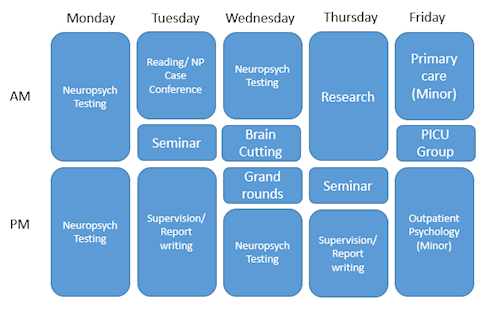Neuropsychology Major Rotations
Neuropsychology Major Rotations
The West Virginia University School of Medicine provides a 50% neuropsychology internship training program that is in accordance with the Houston Conference Guidelines. Throughout the 12 months, the intern will complete three, 4-month rotations, working directly with one faculty supervisor for each of the four-month periods. Interns conduct two neuropsychological evaluations per week and participate in feedbacks, psychotherapy, and at times cognitive rehabilitation. The intern participates and gets exposure to awake craniotomy language mapping, Wada evaluations, observation of various neurosurgeries, and participation in several multidisciplinary teams. Interns will participate in weekly neuropsychology-focused case conference, multidisciplinary team meetings, and professional development and Board exam preparation activities. A pediatric neuropsychology rotation is available for the training year.
Major Rotations
The intern will work with four supervisors during their training year. Interns spend three days per week with their major supervisor per quarter.
Supervisors:
- Liv E. Miller, PsyD, ABPP-CN
- Cierra M. Keith, PhD
- David Scarisbrick, PhD
- Nicholas Jasinski, PhD, ABPP-CN/FR
- James J. Mahoney, PhD.
- Alexandria Perle, PsyD
- Holly Phelps, PhD
- Ben Eschler, PhD
- Krestin Radonovich, PhD – Pediatric Neuropsychology
- Sam Eckrich, PhD – Pediatric Neuropsychology
- DJ Bernat, PhD, ABPP-CN – Pediatric Neuropsychology
All three rotations will focus on the evaluation of primarily outpatients with neurological, medical and psychiatric diseases. Some evaluations are also performed with inpatients in the psychiatric hospital and occasionally in consultation to various services in Ruby Memorial Hospital.
Our clinic offers experience with a rich and diverse patient population, including, but not limited to, individuals with various neurodegenerative conditions, traumatic brain injuries, brain tumors, strokes, movement disorders, cardiovascular disease, learning and attention disorders, and patients diagnosed with severe mental illness and substance abuse. Exposure to neuroimaging is an integral part of the rotation, and patients' MRI, CT, and/or PET scan images are routinely reviewed during evaluations and in didactics. Experiences are also available to interns through the epilepsy surgery program including performing pre- and post-surgical neuropsychological evaluations, attending multidisciplinary treatment team meetings, and participating in Wada evaluations. Pre- and post-surgical DBS evaluations of patients with Parkinson's disease and essential tremor are also frequently performed. In addition, interns may have the opportunity to observe patient rounds, bedside evaluations, neurobehavioral evaluations in multidisciplinary clinics, and provide cognitive rehabilitation with select patients. Finally, the breadth and depth of clinical experiences is enhanced by weekly didactics including Neuropsychology Case Conference including boards preparation, Neurology Grand Rounds, Psychiatry Grand Rounds, Neuromodulation Team meetings, Epilepsy Boards, Brain Tumor Boards, and infrequent observation of brain dissections.
The pediatric neuropsychology rotation includes evaluation of children ages 3 to 16 with complex medical conditions. Referrals include, but are not limited to brain injury, epilepsy, cancer, and neurodevelopmental disorders. Available pediatric didactics include conferences and grand rounds in epilepsy clinic, craniofacial team, neurology, and the neurodevelopmental center.
Supervision: Interns will meet with each of their supervisors for a total of 2 or more hours per week of individual supervision. Additionally, interns receive informal supervision in the course of observing therapy or conducting co-therapy with the supervisor, staffing after intake evaluations, and in multidisciplinary meetings. Supervision occurs prior to the arrival of a patient, during which time records are reviewed and an assessment strategy is planned. Supervision also occurs during the assessment day to address problems or questions as they are encountered and adjust to the assessment accordingly. Supervision totals 4 or more hours per week.
Sample Schedule:
